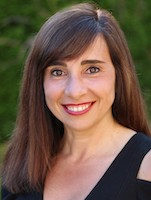Member Spotlight: Yassmine Akkari

- What is your name?
Yassmine M. N. Akkari
- What is your professional title?
Senior Director, Clinical Laboratory, The Steve and Cindy Rasmussen Institute for Genomic Medicine, Nationwide Children’s Hospital; Professor - Clinical Excellence, Department of Pathology, The Ohio State University College of Medicine
- What do you do for your career? How would you describe your role?
Together with a very talented team of clinical directors, I contribute to daily clinical sign-outs of NGS and Cytogenetic cases. In addition, I oversee the operation and test validations of the Cytogenetics and Chromosomal microarray sections and serve as a director Liaison for IT and LIMS.
- What degree(s) and/or training did you receive to achieve your position?
I have a B.Sc. in Biology, a PhD in Molecular Genetics and am ABMGG-certified in Clinical Cytogenetics, Molecular Genetics, and Ph.D. Medical Genetics.
- How did you decide to enter the field/What (or who) brought you into the field?
My high school biology teacher in Lebanon. She was lecturing about mitosis, meiosis, replication, transcription and translation, and I was hooked. I was also fascinated by the theory of heredity and wanted to better understand how it related to human disease.
- Who or what inspires you?
Our patients are my biggest inspiration. We get the privilege of helping people during the most important and often the most challenging moments of their lives. The ability to contribute to their care, and potentially their cure, is truly inspiring.
- How does your work help patients?
In this era of personalized medicine, we have seen the direct impact of our clinical genomic laboratory reports on patient diagnoses, therapeutics and risk stratification. For example, it is extremely motivating to know that our ability to detect favorable genomic lesions can spare the patient high toxicity treatment regimens.
- What is the greatest challenge you face in your work?
Not enough time to engage in all the clinical, educational, and mentoring activities that I would love to be involved in. In addition, juggling many responsibilities in a given day can be challenging.
- What is the best part of your work as you see it? (most interesting, fun…)
- Working on clinical cases and helping patients
- Interacting with colleagues and learning from them.
- Being a mentor to trainees and early career colleagues
- Contributing to important topics/practice guidelines for our genomics community
- How long have you been an AMP member and why did you join?
I have been an AMP member for 10 years. I joined during my Molecular Genetics fellowship and had sought out AMP to improve my knowledge in the field of molecular genetics and pathology. Since then, I have found AMP to be a very welcoming organization with an unrelenting mission to help its membership, the patients and the broader community.
- In your opinion, what are the most valuable aspects of AMP membership?
Ability to engage in and contribute to its mission and goals. In addition, its leadership allows for the creation of many resources that are tremendously helpful to our profession.
- What AMP resources/courses have helped you advance your career?
All the resources that are created by AMP’s Training & Education committee. In addition, AMP has welcomed my interest in being engaged which has surely helped me grow both as a scientist and as a leader.
- In what ways have you previously been involved with AMP?
I have been very fortunate to be involved in the Training & Education committee both as a member and as a chair, as well as in the program committee as a chair-elect and present chair. In addition, I was a part of the Trainee and Early Career taskforce. All of these have been extremely rewarding not only because of what I learned from my colleagues, but also because these activities allowed me to interact with the AMP staff and appreciate their amazing contributions to our organization.
- What committee are you currently on and what motivated you to volunteer for an AMP committee?
I have the privilege of currently serving as the chair of the program committee. In this capacity, I get to work with the committee at large and the AMP staff to collectively put together an annual meeting that keeps our membership engaged in Molecular Pathology and informed of the latest advances in genetics, oncology, infectious disease, informatics and technical topics. I was motivated to give back to an organization that has so positively impacted my career.
- What do you enjoy most about being a part of an AMP committee?
Learning from others!
- What’s your advice to early career/trainee/new AMP members?
Stay engaged in AMP, volunteer and keep trying! Your voice matters at every stage of your career.















